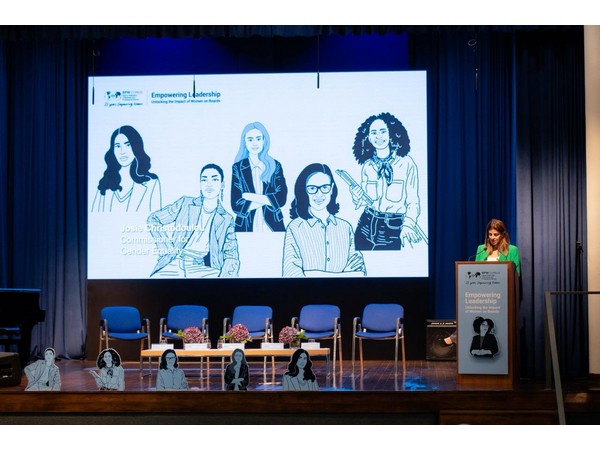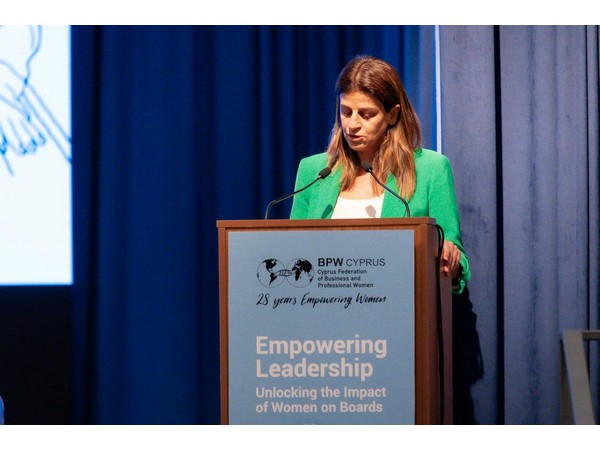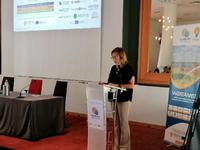Press Releases
01-12-2024 10:02
Address by the Commissioner for Gender Equality, Ms Josie Christodoulou, at the BPW-Cyprus Conference titled “Empowering Leadership: Unlocking the Impact of Women on Boards”
I would like to thank the Cyprus Federation of Business and Professional Woman (BPW Cyprus) for the invitation to address this conference and for its commitment to promoting gender equality in the key area of business leadership.
We have come a long way when it comes to gender equality. However, it is still an undeniable fact that women and men do not enjoy equal access to opportunities in many sectors, including in business and leadership. Women, the majority of the population, are still underrepresented in business and in positions of decision-making.
In order to understand the reasons behind it we need to have a full picture of the story, history, or rather herstory, behind it. Therefore, to frame it, we must see, recognise and understand that one of the reasons of underrepresentation lies in historic unequal power relations between women and men.
At the same time, women fought through time, have many victories, have broken many glass ceilings; they have unstuck from sticky floors and there are many successful business women and some are here today amongst us. But we are not there yet. It is not by accident that according to the European Institute for Gender Inequality (EIGE), Europe, the continent that scores best on gender equality, will still need 100 years to reach substantial equality. At the same time, I want to stress and make clear that gender equality is not a competition between women and men. It is about democracy and it is also financially sustainable.
Let’s take a closer look, a more critical look, at numbers and facts that identify the problem and tell us that we need to do much more with regard to business and leadership, but also understand the positive aspects of balanced representation.
As mentioned earlier, women make up half of the world’s global population, yet they are the minority in the world of business. As a result, they do not have equal say on matters that affect them personally, their environment, and the quality of their professional life. The theme of today’s conference is a key element in the broader effort to change this and establish substantial gender equality.
Worldwide, women perform 66% of the world’s work (paid and unpaid) and they receive 10% of the world’s income. Yet, they reinvest 90% of their income into family and community. When it comes to leadership in Europe, according to EIGE statistics (2021), the share of women on the boards of the largest publicly listed companies registered in the EU-27 was 30.6%.
On a national level, according to EIGE (2023) the share of women board members in the largest quoted companies, supervisory board or board of directors, was 12% and in the central bank it was 13%. When it comes to board members of public companies, according to the latest 2024 EIGE statistics, women account for 11.4%. In semi-governmental organisations women reach 30% presidents or vice-presidents and 37.7% at the ministerial council, a first in our country’s history.
With regard to private businesses, if we take a look at McKinsey’s latest statistics on women’s representation in corporate roles, at entry level it is almost 50%, at managerial level a bit less than 40%, at senior management level at slightly higher than 35% and at C- suite level women make up less than 30% of executive managers.
These numbers confirm that business leadership is still dominated by men. In order to balance this, we need to first identify and address the causes. According to She Figures 2021 data, in the European Union (EU), on average, at Bachelor’s and Master’s levels, women students outnumber men (54% and 59%, respectively). At Doctoral level, student numbers are almost gender balanced. However, disparities between study fields persist. Why do they persist? Because gender stereotypes have through time dictated “appropriate” roles for women and men: family and home care, the invisible, unpaid work, is considered a woman’s job while men are expected to seek professional success and provide financial stability for their family. Consequently, professions are categorised into those “appropriate” for men and women. As a result, women do not enjoy equal access to career development opportunities and face disproportionate burdens in balancing work and family responsibilities. This also leads to their absence from boardrooms.
The growing call for gender balanced participation in boardrooms is driven by both ethical considerations and compelling business arguments. Let me highlight a few key benefits of having more women in decision-making roles:
- Improved financial performance: Research by McKinsey & Co. for the year 2023 has shown that companies with a higher percentage of women on their boards tend to financially outperform those with fewer women by 39%.
- Enhanced decision-making: A gender-balanced board is more likely to consider a broader range of viewpoints, leading to more balanced and informed decision-making. Women's leadership styles, which often prioritise collaboration and inclusivity, can help apply a holistic approach to complex challenges.
- Social responsibility: The inclusion of women in management teams often leads to a greater focus on social responsibility, environmental sustainability, and ethical governance issues that are increasingly important to consumers, investors, and employees. Moreover, women in business, because of social stereotypes, often focus on addressing social issues, including those related to education, healthcare, and sustainable development, while they contribute to the reduction of gender inequality in the labour market by creating jobs not only for themselves, but also for others.
- Innovation and diversification: Women's different life experiences and perspectives can spur new ideas and creative solutions, fostering an environment of innovation. Women-led businesses can help diversify industries and markets by introducing different products and services that may otherwise be overlooked.
- Risk management: Again because of stereotypes, women tend to take a more cautious and risk-aware approach. Their involvement in decision-making can help boards better assess potential risks and make more calculated, strategic decisions that avoid short-term, high-risk manoeuvres in favour of sustainable growth.
It therefore becomes evident that by not having enough women in leadership, not only are women deprived of the chance to grow and prosper personally, but organisations themselves and society as a whole miss out significantly. This realisation prompts us to take action so as to deconstruct biases that hinder women's progress in ascending to top executive positions and board membership.
Dear friends,
Gender Equality is a horizontal priority for Nikos Christodoulides’ government and in this way, we are working horizontally and holistically.
Our Office, which was established by law last July, is now responsible, amongst others, for formulating, coordinating and evaluating the implementation of the National Strategy for Gender Equality in cooperation with all ministries and deputy ministries. The way we go about it is by applying gender mainstreaming in public policies. In other words, we do not just tick boxes, but we make sure that an action in one area is reinforced and complemented by actions in other areas. Our strategy includes actions that promote and leadership directly or indirectly. Their implementation is based on collaborations between competent ministries and other stakeholders. Allow me to highlight some of our targeted but also holistic actions that are included in the strategy for Gender Equality:
- Our office took the initiative to accelerate the process of harmonising our national legislation with the EU Directive on the equal representation of women and men on the boards of listed companies.
To this end, we are currently working together with the Ministry of Finance and the Law Office. We have to thank France for taking the initiative to reopen the file at EU level and for leading the way on a national level.
- Addressing the gender salary gap, which currently stands at around 10%, we are conducting a survey to identify any distortions between professions, mostly those considered either “male-dominated” or “female-dominated”. The aim is to identify the criteria that determine pay and to assess the extent to which gender plays a role in the process. The Ministry of Labour and Social Insurance will conduct its own qualitative analysis of the salary gap between men and women. At the same time, the Ministry of Labour is already preparing for the transposition of the EU directive on pay transparency into our legislation by 2026. More specifically, it is currently running a preparatory process, evaluating and designing the infrastructure needed, as well as the practical aspects of introducing new legislation and measures.
- Addressing the issue of life-work balance and time availability for women, measures such as the extension of maternity leave to 22 weeks, the increase of care structures for children and the elderly through the EU’s Recovery and Resilience Facility (RRF), and the introduction of compulsory pre-primary education from the age of four, will allow women the time and energy they need to fulfil their professional ambitions and advance. Additionally, the extension of parental leave until the child reaches the age of 15, compared to today’s eight, will be in effect by the end of the year.
- The Ministry of Agriculture, Rural Development and Environment is currently providing training for women in rural areas and farmers to enhance their economic independence and leadership.
- As regards corporate practices, last summer our Office and the Cyprus Chamber of Commerce and Industry jointly formulated an “Action Plan for gender equality”. Through specific actions listed in the form of recommendations, the goal is to promote gender equality in the operation of business organisations.
- In order to break gender segregation in employment, we launch an annual thematic campaign under the umbrella title HerStory. Through the personal stories of successful women leaders in male-dominated fields, we provide role models for other women and girls to follow in their footsteps. At the same time, from this school year, the Ministry of Education has introduced training for career advisers in schools aimed at breaking stereotypes and unconscious biases. This way, students –girls and boys– will be guided to select their professional path based on their inclinations and preferences, rather than on their gender.
Our office is currently exploring with the Cyprus Employers & Industrialists Federation (OEB) joint actions in relation to women, work, business and leadership, soon to be announced.
Dear friends,
The above are some of our efforts to bridge the pay gap and also provide women with space and the possibility to have a choice, a free choice, to be what they aspire to be. To lead the way.
In closing, I would like to stress that the effort to accelerate the process towards gender equality, including overcoming the challenges women entrepreneurs face, requires continued support of and collaborations between public and private sectors. I would like to repeat that gender equality is not a competition between women and men and it is not about ticking boxes. Gender equality is not another issue we need to solve but the solution to some of today’s biggest business, economic and social challenges.
Thank you.
(AD/AP/IA)
Relevant Press Releases











